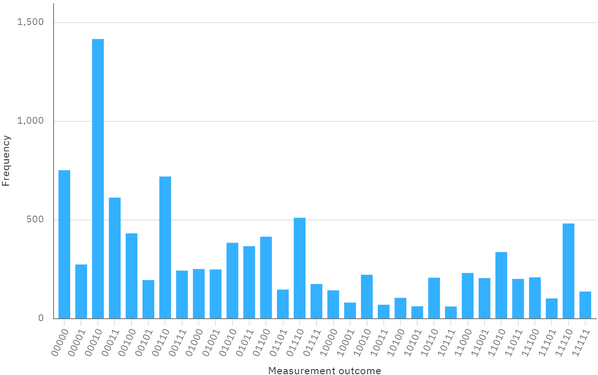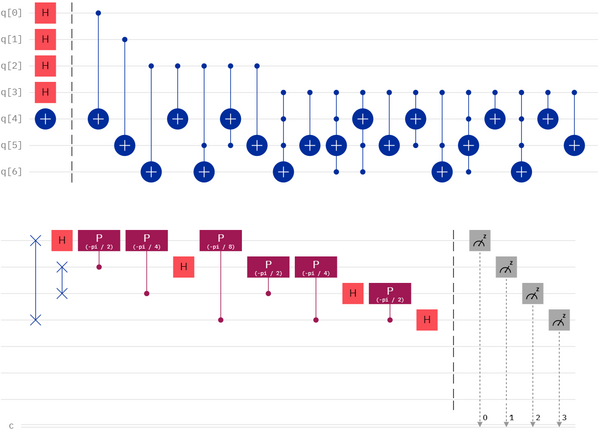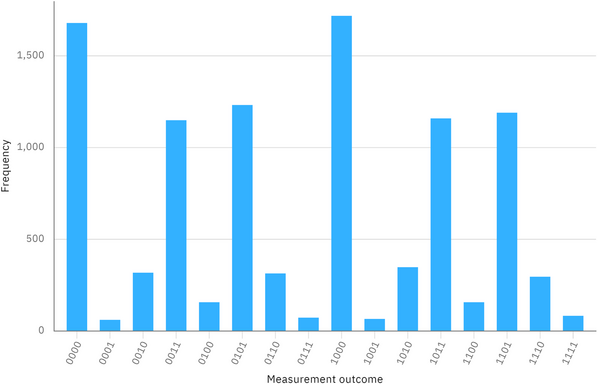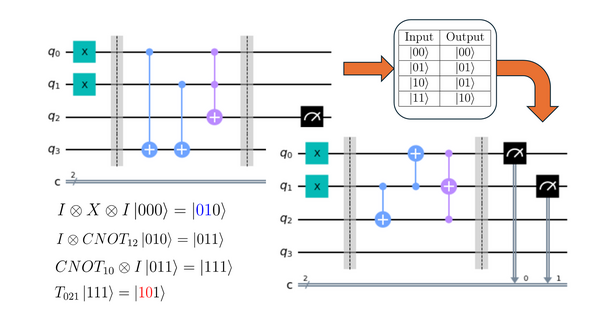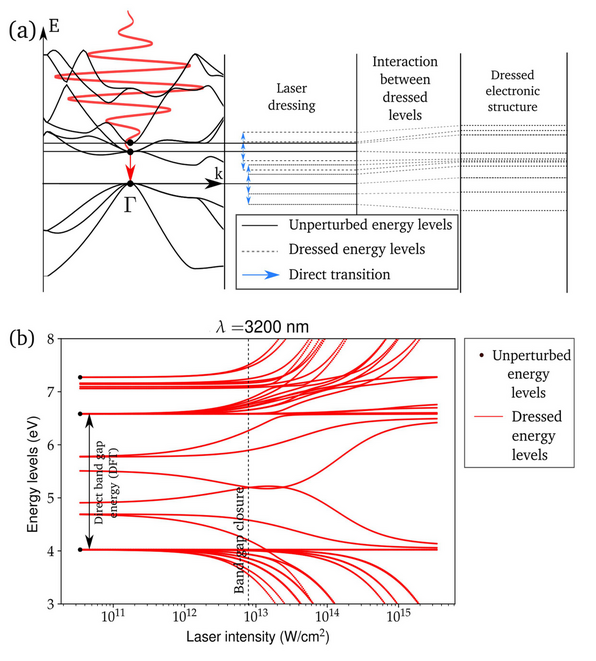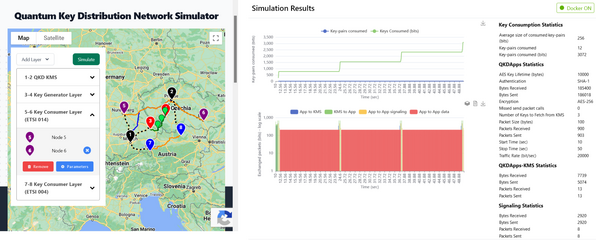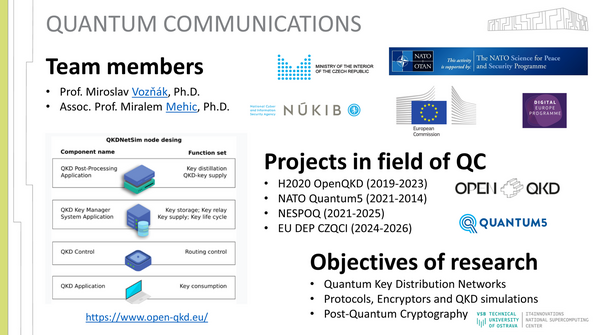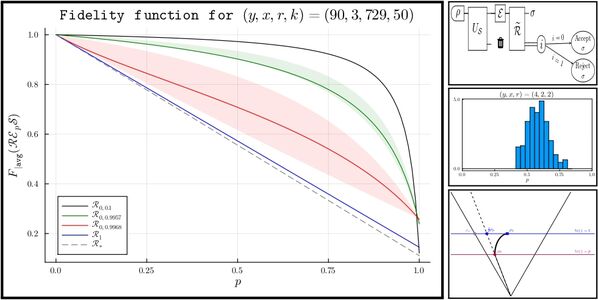In the Quantum Computing Lab, innovation and collaboration come together to shape the future of quantum technology. Situated at the forefront of quantum computing research, our laboratory is dedicated to advancing theoretical understanding, developing practical applications, and fostering partnerships between academia and industry. Specializing in areas such as Optimization Problem Solving, Quantum Machine Learning, Quantum Factorization, Quantum Circuit Optimization, and Quantum Error Correction, we explore the vast potential of quantum computing across diverse domains. Moreover, our commitment to education ensures that knowledge and expertise are shared and cultivated among future generations of quantum scientists and engineers.
Portfolio
Solving Optimization Problems Using QAOA
The Quantum Approximate Optimization Algorithm (QAOA) is another type of Variational Quantum Algorithm (VQA). Similar to VQE, it aims to find the minimum eigenvalue, but in this case, the corresponding value of the state vector is of greater importance. This eigenvector should ideally represent the solution to the optimization problem encoded in the operator used. The applicability of this algorithm is only limited by the feasibility of encoding the given optimization problem into such an operator. Therefore, it can be utilized for a broad spectrum of combinatorial optimization problems, including Set Packing, Graph Partitioning, Job Sequencing, and Traveling Salesman, among others. Moreover, there are intriguing possibilities for employing QAOA in various domains such as finance (portfolio optimization), power engineering (enhancing grid resilience), communication (binary symbol detection), biochemistry (protein folding), computer vision (object detection), machine learning (model training), and more. Our experimentation involves tuning this algorithm to achieve improved accuracy and faster convergence towards the correct solution to the problem.
Quantum Machine Learning
Quantum machine learning is a research and engineering area that explores the interplay of phenomena of quantum mechanics and machine learning. Such intrinsic features of quantum mechanics as linearity, randomness, superposition, and entanglement can be naturally employed to process data using quantum resources. Many classical machine learning techniques use linear algebra and probability theory as their foundations; therefore, a natural mapping exists between the mathematical theory of machine learning and the two first features of quantum mechanics. Yet those last two phenomena open the door to a new era of computational power, allowing us to tackle previously too complex or time-consuming challenges.
- Devising certification and learning techniques for quantum operations
- Creating new validation and benchmarking methods of NISQ architectures
- Using Quantum networks to quantum algorithms
- Developing the causal structure theory
Quantum Factorization of Semiprimes
The exponential computational complexity of the factorization of large semiprimes is the basis of the security of RSA – the most widespread current cryptosystem used for secure data transmission. The best current factorization algorithms, programmable on classical computers, are of sub-exponential complexity. Today's supercomputers would take billions of years to successfully factorize an RSA key of 2048 bits (the currently recommended and most used length).
It is, therefore, essential for the security of global data transmission to know that even quantum computers cannot factor such a long key in a reasonable time and thus get to the transmitted information.
There are basically two ways to factorize semiprimes using a quantum computer. The first uses the well-known Shor's algorithm, which complicates the need for a quantum implementation of a modular exponentiation function. Therefore, this algorithm has so far been able to factorize only the number 21 on a quantum computer, and ambiguous results were measured when trying to factorize the number 35. Our efforts aim to factorize much larger numbers using this algorithm successfully.
The second way is to convert the factorization problem into an optimization problem. This can then be solved by quantum annealing or adiabatic quantum computation, which is the basis of the aforementioned QAOA. Much larger numbers have been factorized in this way (the largest so far is 1099551473989). Still, the success of these factorizations has depended heavily on classical calculations to reduce the number of qubits needed. As part of solving optimization problems using QAOA, we also deal with this method of factorization.
Quantum Circuits Optimization
Quantum circuit optimization is a critical process aimed at enhancing the efficiency and performance of quantum algorithms by minimizing the resources required for their execution. In the realm of quantum computing, where qubits are the fundamental units of computation, optimizing quantum circuits becomes pivotal due to the inherent fragility and limited coherence times of qubits. This optimization involves various techniques such as gate merging, gate cancellation, and qubit reordering, all aimed at reducing gate counts, depth, or other metrics while preserving the functionality of the circuit. By streamlining quantum circuits, researchers can mitigate errors, improve scalability, and pave the way for the realization of practical quantum algorithms capable of solving complex computational problems efficiently. Additionally, quantum circuit optimization plays a crucial role in bridging the gap between theoretical algorithms and their real-world implementations on quantum hardware, thereby advancing the field of quantum computing towards achieving its full potential.
Quantum Dynamics of Structures
The Quantum Dynamics of Structures group proposes a portfolio of predictive simulation techniques in the fields of “deep-tech” (e.g., photonics, polaritonics, chemical physics, spectroscopy), both at the classical and quantum levels. Supported by simulation tools of quantum molecular dynamics (“ab-initio” density functional tight binding (DFTB), time-dependent density functional theory (TDDFT)) and estimation tools in both quantum and classical polaritonics,
the group offers predictions and frontier knowledge for accelerating discoveries and tailoring needs in various fields of science and technologies. Domains of applications of the group comprise
the design of physical qubits for preparing the quantum machines of tomorrow, using knowledge gained through the exploration
of dynamics of various structures (light, matter, quasi-particles) found in a number of systems in physics, chemistry, spectroscopy, and beyond.
Quantum error correction
Quantum error correction (QEC) is a sophisticated encoding-decoding process designed to shield quantum information from the disruptive effects of quantum noise. QEC is a fundamental ingredient in the pursuit of fully operational quantum computers. A major breakthrough in this field came with Shor's code, a pioneering method that encodes a single logical qubit into nine physical qubits, laying the foundation for modern quantum error correction. Several criteria determine the types of noise that can be corrected, with most relying on the Knill-Laflamme theorem. If its conditions are met, the receiver can construct a decoding scheme that restores the original information. Quantum error correction has evolved dramatically, drawing inspiration from classical techniques. Notable examples include the Calderbank-Shor-Steane (CSS) codes, Quantum Reed–Solomon Codes, and the stabilizer QEC codes. Researchers continue to push the boundaries, exploring innovative approaches such as entanglement-assisted error-correcting codes, which harness shared entanglement to enhance error correction. As the field advances, the dream of fault-tolerant quantum computing edges closer to reality.


